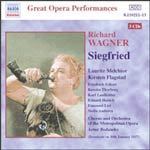
Siegfried (Complete opera) Met broadcast of 1937
 $49.00
Out of Stock
$49.00
Out of Stock6+ weeks add to cart
WAGNER
Siegfried (Complete opera) Met broadcast of 1937
Kirsten Flagstad / Lauritz Melchior
[ Naxos Great Opera Recordings / 3 CD ]
Release Date: Thursday 3 October 2002
This item is currently out of stock. It may take 6 or more weeks to obtain from when you place your order as this is a specialist product.
"Friedrich Schorr is a superb wanderer, Kerstin Thorborg a majestic Erda, and the radiance of Kirsten Falgstad's Brunnhilde has to be heard to be believed."
- David Cairns, The Sunday Times 07 July 2002
"Taken from a 1937 radio broadcasting from the Met, this is the only extant performance of Siegfried to feature Lauritz Melchior in the title role. The beauty of his singing is matchless in Wagner and he seems inexhaustible. The rest of it is equally gob-smacking. Kirsten Flagstad is at her most opulent as Brunnhilde while Frederich Schorr, super-sensitive and subtle, illuminates every facet of Wotan's tragic predicament."
- Tim Ashley, The Guardian -19 July 2002
The Met broadcast of 1937 appears to be the only extant recording of these singers together in Siegfried; also, indeed, the only complete recording of the work on which Melchior appears, though this performance observes Bodansky's customary cuts in the second and third scenes of Act 3. Melchior originally sang the young Siegfried in Magdeburg, in Germany, in 1925, the first of the 128 performances that he gave over a 23-year period. His records of extracts from Siegfried were many, the first made even before his stage début in the rôle, the most famous being extended scenes recorded by HMV with the London Symphony Orchestra, under various conductors, between 1929 and 1932. From the evidence of this Metropolitan performance, Melchior had all the resources - and more - needed to maintain power and freshness through to the vocally testing final scene with Brünnhilde. His is a remarkable achievement, surely unique amongst several generations of Heldentenors.
Flagstad was still a comparative newcomer to Siegfried's wild wutende Weib at the time of this recording. She first sang the rôle in November 1935 in San Francisco, conducted by Bodansky. It featured less prominently in her subsequent career than the two other Brünnhildes, totalling just thirty performances, of which twenty were with the Met company. It is the shortest of the three rôles, but nevertheless demands strong, exultant expression, which Flagstad provides aplenty. Those magical phrases as she greets the sun on her awakening, the rapturous duet with which the final scene closes and the darker, vulnerable passages that link them, all are handled with radiance and grandeur for, in Wagner, Flagstad was always an aristocrat.
In this rush of praise, the contributions of the other principals must not be forgotten. Schorr's Wanderer was familiar to Met audiences; nobility of utterance and apparently effortless legato make his interpretation one of the most memorable of the twentieth century, his beauty of tone unique among Wagnerian bass-baritones. Just a month after her Met début, Thorborg sings a resonant Erda, her voice glowing with its rich bloom; Ernest Newman averred that she was the 'greatest Wagnerian actress of the present day', in an age that boasted a host of fine sopranos and mezzos and it is not surprising that she was engaged at the Met for fourteen further seasons. Laufkötter's name is less familiar, but in this, also his first Met season, he wheedles and sings as Mime, not resorting to the exaggerated yelps that some interpreters prefer. Together with Schorr and Habich, (a most effective Alberich) he appears on an equally thrilling Das Rheingold (Naxos 8.110047-8) recorded nine weeks later in Boston.
Enthusiasts will always argue and discuss the merits of different recorded performances. Suffice it to say that in this Siegfried are assembled the four greatest Wagnerian singers of their day, perhaps of the century, and that surely counts for much.

